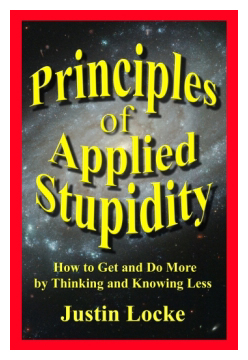So there was a report in Newsweek last week about how American creativity is declining.
http://www.newsweek.com/2010/07/10/the-creativity-crisis.html
I agree with this report, sort of . . . although I would have worded it in a different way. Our creativity is the same as it was. Our national efforts to suppress it, however, have been magnificently successful.
I do not consider myself to be any more creative than anyone else. I have, however, been more successful than most people in resisting outside efforts to suppress my creativity. I can’t take much credit for it, it’s mostly the result of circumstances (growing up poor) and luck (I have the rare obnoxious gene).
In my opinion, one of the biggest reasons why American creativity is flagging is because of our fascination with, and emphasis upon, tests.
I cover this in more detail in “Principles of Applied Stupidity,” but briefly recapped, we place enormous emphasis on a student’s ability to take tests, and like anything else, while I suppose there may be benefits, there are also unintended side effects. (Whether these side effect are undesirable or not depends on your point of view.)
First of all, tests are essentially an environment where one is rewarded for parroting back a pre-existing answer to a pre-existing question. For the test taker, the desired reward of higher rank/status is gained if you give the answer that is desired by the test giver. Any new and/or different answers that don’t match the pre-existing answer do not get the desired reward, therefore in test culture, creativity is actually a liability.
That’s just the half of it. The second part has to do with the avoidance of mistakes. In test culture, mistakes translate to loss of benefits. The fewer mistakes you make, the higher your score on the test. The higher your test scores, the more rewards you get. Therefore you and everyone in your social support team come to accept and believe that mistakes are bad, period. It becomes an ingrained reflex.
Working in the creative realms that I do, I have come to dread that awful moment when I have to present my “new idea” to someone who is immersed in test culture. 99.98% of the time, that person will respond with confusion when confronted with an unfamiliar thought. It does not sound “correct” to them, since it does not match pre-existing “correct answers.” Next, they respond with enormous resistance to something that allows for any possibility of error or mistakes. Sadly, the only way to avoid errors or mistakes is to do something that has already been done, and so of course this is in conflict with doing something totally new. The fear of a single mistake blinds them to the massive, if slightly flawed at first, potential of new ideas. They think they don’t like it, but in fact the negative feeling they are having is simply one of ingrained mistake fear, i.e., that a person in authority might not like what we’re up to.
Our massive emphasis on testing students creates a culture of obedience and conformity to the “right answers” of the past. It creates a subconscious expectation of always being rewarded for “sameness,” and being punished for variation.
It used to upset me a lot when I encountered people who were the products of this culture. This forced me to sit down and examine this from an anthropological point of view. Now that I understand what drives them (or perhaps I should say, limits them), it doesn’t upset me so much, but it does make me somewhat sad to see so much potential being suppressed and wasted in blind loyalty to an obsolete ideal of factory floor perfection.
© Justin Locke

